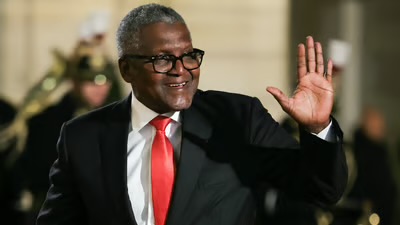
Nigeria’s biggest refinery is bypassing third parties. We unpack what it means for fuel prices, competitors, and consumers.
On Sunday, Dangote Petroleum Refinery announced it will begin distributing petrol and diesel directly from its facility to fuel stations, depots, manufacturers, and telecom companies using its fleet of road tankers marking the company’s formal entry into the country’s downstream sector – nearly a year after the government ended decades of fuel subsidies and price controls.
The company said it has invested in the procurement of 4,000 compressed natural gas (CNG)-powered tankers and is investing in CNG stations that will be supported by over 100 CNG tankers across the country.
What’s the strategy behind the move?
The $20bn Dangote Refinery, with a capacity to process 650,000 barrels per day, began producing diesel and aviation fuel in January 2024 and petrol in September. Within weeks of the petrol rollout, fuel marketing companies began buying directly from the refinery – a major shift after years of import dependence.
By cutting out third-party distributors and moving fuel in its own trucks, Dangote aims to lower logistics costs, expand market reach, and offer more competitive prices. Analysts say the strategy echoes Dangote’s model in the cement industry, where it built a dedicated national distribution network to control margins and supply.
Who will be most affected in the market?
The downstream sector includes state-run Nigerian National Petroleum Company (NNPC) retail outlets, TotalEnergies, private depot owners, and thousands of small independent marketers. Most rely heavily on road tankers, as Nigeria’s pipeline and depot infrastructure remains largely inoperable.
Last year, Dangote struck bulk purchase agreements with marketers including MRS, Ardova, and Heyden, sparking what some observers described as a price war with NNPC. The new direct-to-customer distribution model raises the stakes, particularly for smaller players unable to absorb pricing pressure or invest in CNG fleets.
What impact will this have on fuel prices?
Analysts expect that Dangote’s ability to bypass intermediaries could help lower fuel prices for end users, at least in the short term. “It’s a question of having full control over its supply chain for efficiency, which is a good business model,” said Muda Yusuf, CEO of the Centre for the Promotion of Private Enterprise.
Still, some caution that the full pricing structure is not yet clear. “We haven’t yet seen how the modalities will work out in terms of what the price will be to the consumer,” said Lagos-based oil analyst Ademola Adigun.
Can smaller fuel marketers survive?
Yusuf warns that smaller players will face a tough road ahead. “If you are not strong in any investment environment and there’s intense competition, you are likely to fall by the wayside,” he said.
While larger marketers, such as Mobil stations, may have the scale and tanker fleets to compete, others may need to transition to CNG or find niche markets to survive. “Those that may be affected are those who are marginal players in that space,” Yusuf added.
Will Dangote replace NNPC in fuel distribution?
Adigun believes Dangote is well positioned to become the dominant fuel distributor, potentially replacing NNPC as the central player in Nigeria’s downstream sector. The company already has experience in managing large-scale logistics and distribution, with thousands of trucks used to deliver cement nationwide.
“Imagine how easily his business can be frustrated if he had to depend on third parties to deliver over 10,000 trucks in cement,” Yusuf said. “It has worked for him in cement, and I’m sure it will also work for him in the oil sector.”
(The Africa Report)

